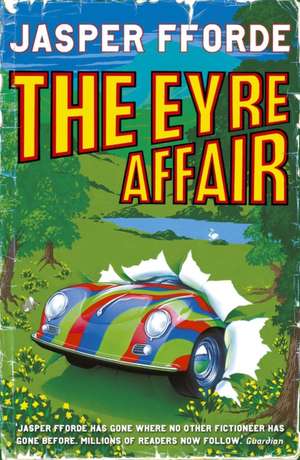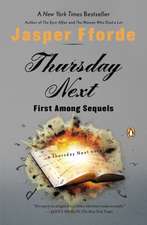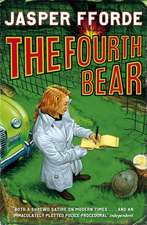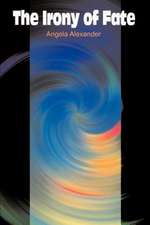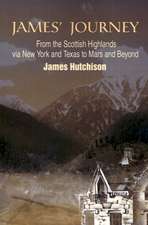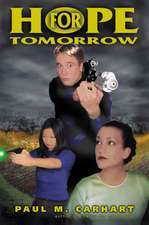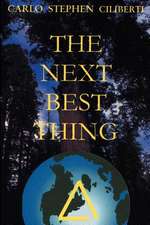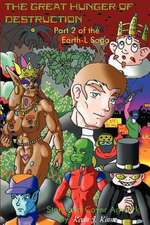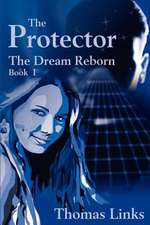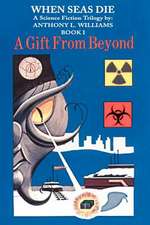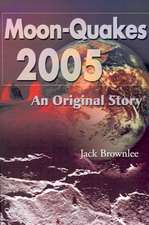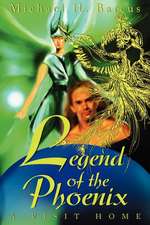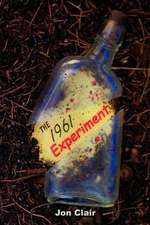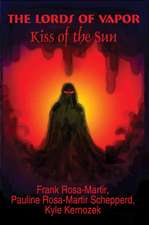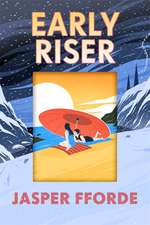The Eyre Affair: Thursday Next
Autor Jasper Ffordeen Limba Engleză Paperback – 19 iul 2001
| Toate formatele și edițiile | Preț | Express |
|---|---|---|
| Paperback (2) | 49.42 lei 3-5 săpt. | +25.93 lei 7-13 zile |
| HODDER AND STOUGHTON LTD – 19 iul 2001 | 49.42 lei 3-5 săpt. | +25.93 lei 7-13 zile |
| Penguin Books – 31 ian 2003 | 97.34 lei 3-5 săpt. |
Preț: 49.42 lei
Preț vechi: 64.10 lei
-23% Nou
Puncte Express: 74
Preț estimativ în valută:
9.46€ • 9.90$ • 7.82£
9.46€ • 9.90$ • 7.82£
Carte disponibilă
Livrare economică 15-29 martie
Livrare express 01-07 martie pentru 35.92 lei
Preluare comenzi: 021 569.72.76
Specificații
ISBN-13: 9780340733561
ISBN-10: 034073356X
Pagini: 373
Dimensiuni: 152 x 196 x 25 mm
Greutate: 0.27 kg
Editura: HODDER AND STOUGHTON LTD
Colecția Hodder Paperbacks
Seria Thursday Next
Locul publicării:United Kingdom
ISBN-10: 034073356X
Pagini: 373
Dimensiuni: 152 x 196 x 25 mm
Greutate: 0.27 kg
Editura: HODDER AND STOUGHTON LTD
Colecția Hodder Paperbacks
Seria Thursday Next
Locul publicării:United Kingdom
Notă biografică
Jasper Fforde's first novel was publishing to astonishing critical and commercial success in 2001. Since then he has written 3 other Thursday next novels, and is working on the first in a new series of crime novels. Jasper lives near Hay-on-Wye and flies Tiger Moth aeroplanes as relaxation.
Cuprins
1. A Woman Named Thursday Next
2. Gad's Hill
3. Back at My Desk
4. Acheron Hades
5. Search for the Guilty, Punish the Innocent
6. Jane Eyre: A Short Excursion in the Novel
7. The Goliath Corporation
8. Airship to Swimdon
9. The Next Family
10. The Finis Hotel, Swindon
11. Polly Flashes Upon the Inward Eye
12. SpecOps-27: The Literary Detectives
13. The Church at Capel-y-ffin
14. Lunch with Bowden
15. Hello and Goodbye, Mr. Quaverley
16. Sturmey Archer and Felix7
17. SpecOps-17: Suckers and Biters
18. Landen Again
19. The Very Irrev. Joffy Next
20. Dr. Runcible Spoon>br> 21. Hades and Goliath
22. The Waiting Game
23. The Drop
24. Martin Chuzzlewit Is Reprieved
25. Time Enough for Contemplation
26. The Earthcrossers
27. Hades Finds Another Manuscript
28. Haworth House
29. Jane Eyre
30. A Groundwell of Popular Feeling
31. The People's Republic of Wales
32. Thornfield Hall
33. The Book Is Written
34. Nearly the End of Their Book
35. Nearly the End of Our Book
36. Married
2. Gad's Hill
3. Back at My Desk
4. Acheron Hades
5. Search for the Guilty, Punish the Innocent
6. Jane Eyre: A Short Excursion in the Novel
7. The Goliath Corporation
8. Airship to Swimdon
9. The Next Family
10. The Finis Hotel, Swindon
11. Polly Flashes Upon the Inward Eye
12. SpecOps-27: The Literary Detectives
13. The Church at Capel-y-ffin
14. Lunch with Bowden
15. Hello and Goodbye, Mr. Quaverley
16. Sturmey Archer and Felix7
17. SpecOps-17: Suckers and Biters
18. Landen Again
19. The Very Irrev. Joffy Next
20. Dr. Runcible Spoon>br> 21. Hades and Goliath
22. The Waiting Game
23. The Drop
24. Martin Chuzzlewit Is Reprieved
25. Time Enough for Contemplation
26. The Earthcrossers
27. Hades Finds Another Manuscript
28. Haworth House
29. Jane Eyre
30. A Groundwell of Popular Feeling
31. The People's Republic of Wales
32. Thornfield Hall
33. The Book Is Written
34. Nearly the End of Their Book
35. Nearly the End of Our Book
36. Married
Recenzii
"[Thursday Next is] part Bridget Jones, part Nancy Drew, and part Dirty Harry." —Michiko Kakutani, The New York Times
"Neatly delivers alternate history, Monty Pythonesque comedy skits, Grand Guignol supervillains, thwarted lovers, po-mo intertextuality, political commentary, time travel, vampires, absent-minded inventors, a hard-boiled narrator, and lots, lots more.... Suspend your disbelief, find a quiet corner and just surrender to the storytelling voice of the unstoppable, ever-resourceful Thursday Next." —The Washington Post
"Fforde's imaginative novel will satiate readers looking for a Harry Potter-esque tale.... The Eyre Affair's literary wonderland recalls Douglas Adams's Hitchhikers series, the works of Lewis Carroll and Woody Allen's The Kugelmass Episode." —USA Today
"Filled with clever wordplay, literary allusion and bibliowit, The Eyre Affair combines elements of Monty Python, Harry Potter, Stephen Hawking and Buffy the Vampire Slayer, but its quirky charm is all its own." —The Wall Street Journal
"Jasper Fforde's first novel, The Eyre Affair, is a spirited sendup of genre fiction—it's part hardboiled mystery, part time-machine caper—that features a sassy, well-read 'Special Operative in literary detection' named Thursday Next, who will put you more in mind of Bridget Jones than Miss Marple. Fforde delivers almost every sentence with a sly wink, and he's got an easy way with wordplay, trivia, and inside jokes.... Fforde's verve is rarely less than infectious." —The New York Times Book Review
"[Fforde] delivers multiple plot twists, rampant literary references and streams of wild metafictional invention in a novel that places literature at the center of the pop-cultural universe.... It all adds up to a brainy, cheerfully twisted adventure." —Time Out New York
"[The Eyre Affair] is a blend of suspense and silliness, two parts fantasy (think Alice in Wonderland meets Superman), two parts absurdity (think Carl Hiaasen) and one part mystery (Agatha Christie meets Sue Grafton)." —St. Louis Post-Dispatch
"Neatly delivers alternate history, Monty Pythonesque comedy skits, Grand Guignol supervillains, thwarted lovers, po-mo intertextuality, political commentary, time travel, vampires, absent-minded inventors, a hard-boiled narrator, and lots, lots more.... Suspend your disbelief, find a quiet corner and just surrender to the storytelling voice of the unstoppable, ever-resourceful Thursday Next." —The Washington Post
"Fforde's imaginative novel will satiate readers looking for a Harry Potter-esque tale.... The Eyre Affair's literary wonderland recalls Douglas Adams's Hitchhikers series, the works of Lewis Carroll and Woody Allen's The Kugelmass Episode." —USA Today
"Filled with clever wordplay, literary allusion and bibliowit, The Eyre Affair combines elements of Monty Python, Harry Potter, Stephen Hawking and Buffy the Vampire Slayer, but its quirky charm is all its own." —The Wall Street Journal
"Jasper Fforde's first novel, The Eyre Affair, is a spirited sendup of genre fiction—it's part hardboiled mystery, part time-machine caper—that features a sassy, well-read 'Special Operative in literary detection' named Thursday Next, who will put you more in mind of Bridget Jones than Miss Marple. Fforde delivers almost every sentence with a sly wink, and he's got an easy way with wordplay, trivia, and inside jokes.... Fforde's verve is rarely less than infectious." —The New York Times Book Review
"[Fforde] delivers multiple plot twists, rampant literary references and streams of wild metafictional invention in a novel that places literature at the center of the pop-cultural universe.... It all adds up to a brainy, cheerfully twisted adventure." —Time Out New York
"[The Eyre Affair] is a blend of suspense and silliness, two parts fantasy (think Alice in Wonderland meets Superman), two parts absurdity (think Carl Hiaasen) and one part mystery (Agatha Christie meets Sue Grafton)." —St. Louis Post-Dispatch
Extras
A Woman Named Thursday Next
". . . The Special Operations Network was instigated to handle policing duties considered either too unusual or too specialized to be tackled by the regular force. There were thirty departments in all, starting at the more mundane Neighborly Disputes (SO-30) and going onto Literary Detectives (SO-27) and Art Crime (SO-24). Anything below SO-20 was restricted information, although it was common knowledge that the ChronoGuard was SO-12 and Antiterrorism SO-9. It is rumored that SO-1 was the department that polices the SpecOps themselves. Quite what the others do is anyone's guess. What is known is that the individual operatives themselves are mostly ex-military or ex-police and slightly unbalanced. "If you want to be a SpecOp," the saying goes, "act kinda weird . . ."
MILLION DE FLOSS
-A Short History of the Special Operations Network
My father had a face that could stop a clock. I don't mean that he was ugly or anything; it was a phrase the ChronoGuard used to describe someone who had the power to reduce time to an ultraslow trickle. Dad had been a colonel in the ChronoGuard and kept his work very quiet. So quiet, in fact, that we didn't know he had gone rogue at all until his timekeeping buddies raided our house one morning clutching a Seize & Eradication order open-dated at both ends and demanding to know where and when he was. Dad had remained at liberty ever since; we learned from his subsequent visits that he regarded the whole service as "morally and historically corrupt" and was fighting a one-man war against the bureaucrats within the Office for Special Temporal Stability. I didn't know what he meant by that and still don't; I just hoped he knew what he was doing and didn't come to any harm doing it. His skills at stopping the clock were hard-earned and irreversible: He was now a lonely itinerant in time, belonging to not one age but to all of them and having no home other than the chronoclastic ether.
I wasn't a member of the ChronoGuard. I never wanted to be. By all accounts it's not a huge barrel of laughs, although the pay is good and the service boasts a retirement plan that is second to none: a one-way ticket to anywhere and anywhen you want. No, that wasn't for me. I was what we called an "operative grade I" for SO-27, the Literary Detective Division of the Special Operations Network based in London. It's way less flash than it sounds. Since 1980 the big criminal gangs had moved in on the lucrative literary market and we had much to do and few funds to do it with. I worked under Area Chief Boswell, a small, puffy man who looked like a bag of flour with arms and legs. He lived and breathed the job; words were his life and his love-he never seemed happier than when he was on the trail of a counterfeit Coleridge or a fake Fielding. It was under Boswell that we arrested the gang who were stealing and selling Samuel Johnson first editions; on another occasion we uncovered an attempt to authenticate a flagrantly unrealistic version of Shakespeare's lost work, Cardenio. Fun while it lasted, but only small islands of excitement among the ocean of day-to-day mundanities that is SO-27: We spent most of our time dealing with illegal traders, copyright infringements and fraud.
I had been with Boswell and SO-27 for eight years, living in a Maida Vale apartment with Pickwick, a regenerated pet dodo left over from the days when reverse extinction was all the rage and you could buy home cloning kits over the counter. I was keen-no, I was desperate-to get away from the LiteraTecs but transfers were unheard of and promotion a nonstarter. The only way I was going to make full inspector was if my immediate superior moved on or out. But it never happened; Inspector Turner's hope to marry a wealthy Mr. Right and leave the service stayed just that-a hope-as so often Mr. Right turned out to be either Mr. Liar, Mr. Drunk or Mr. Already Married.
As I said earlier, my father had a face that could stop a clock; and that's exactly what happened one spring morning as I was having a sandwich in a small cafŽ not far from work. The world flickered, shuddered and stopped. The proprietor of the cafŽ froze in midsentence and the picture on the television stopped dead. Outside, birds hung motionless in the sky. Cars and trams halted in the streets and a cyclist involved in an accident stopped in midair, the look of fear frozen on his face as he paused two feet from the hard asphalt. The sound halted too, replaced by a dull snapshot of a hum, the world's noise at that moment in time paused indefinitely at the same pitch and volume.
"How's my gorgeous daughter?"
I turned. My father was sitting at a table and rose to hug me affectionately.
"I'm good," I replied, returning his hug tightly. "How's my favorite father?"
"Can't complain. Time is a fine physician."
I stared at him for a moment.
"Y'know," I muttered, "I think you're looking younger every time I see you."
"I am. Any grandchildren in the offing?"
"The way I'm going? Not ever."
My father smiled and raised an eyebrow.
"I wouldn't say that quite yet."
He handed me a Woolworths bag.
"I was in '78 recently," he announced. "I brought you this."
He handed me a single by the Beatles. I didn't recognize the title.
"Didn't they split in '70?"
"Not always. How are things?"
"Same as ever. Authentications, copyright, theft-"
"-same old shit?"
"Yup." I nodded. "Same old shit. What brings you here?"
"I went to see your mother three weeks ahead your time," he answered, consulting the large chronograph on his wrist. "Just the usual-ahem-reason. She's going to paint the bedroom mauve in a week's time-will you have a word and dissuade her? It doesn't match the curtains."
"How is she?"
He sighed deeply.
"Radiant, as always. Mycroft and Polly would like to be remembered too."
They were my aunt and uncle; I loved them deeply, although both were mad as pants. I regretted not seeing Mycroft most of all. I hadn't returned to my hometown for many years and I didn't see my family as often as I should.
"Your mother and I think it might be a good idea for you to come home for a bit. She thinks you take work a little too seriously."
"That's a bit rich, Dad, coming from you."
"Ouch-that-hurt. How's your history?"
"Not bad."
"Do you know how the Duke of Wellington died?"
"Sure," I answered. "He was shot by a French sniper during the opening stages of the Battle of Waterloo. Why?"
"Oh, no reason," muttered my father with feigned innocence, scribbling in a small notebook. He paused for a moment.
"So Napoleon won at Waterloo, did he?" he asked slowly and with great intensity.
"Of course not," I replied. "Field Marshal BlŸcher's timely intervention saved the day."
I narrowed my eyes.
"This is all O-level history, Dad. What are you up to?"
"Well, it's a bit of a coincidence, wouldn't you say?"
"What is?"
"Nelson and Wellington, two great English national heroes both being shot early on during their most important and decisive battles."
"What are you suggesting?"
"That French revisionists might be involved."
"But it didn't affect the outcome of either battle," I asserted. "We still won on both occasions!"
"I never said they were good at it."
"That's ludicrous!" I scoffed. "I suppose you think the same revisionists had King Harold killed in 1066 to assist the Norman invasion!"
But Dad wasn't laughing. He replied with some surprise:
"Harold? Killed? How?"
"An arrow, Dad. In his eye."
"English or French?"
"History doesn't relate," I replied, annoyed at his bizarre line of questioning.
"In his eye, you say?- Time is out of joint," he muttered, scribbling another note.
"What's out of joint?" I asked, not quite hearing him.
"Nothing, nothing. Good job I was born to set it right-"
"Hamlet?" I asked, recognizing the quotation.
He ignored me, finished writing and snapped the notebook shut, then placed his fingertips on his temples and rubbed them absently for a moment. The world joggled forward a second and refroze as he did so. He looked about nervously.
"They're onto me. Thanks for your help, Sweetpea. When you see your mother, tell her she makes the torches burn brighter-and don't forget to try and dissuade her from painting the bedroom."
"Any color but mauve, right?"
"Right."
He smiled at me and touched my face. I felt my eyes moisten; these visits were all too short. He sensed my sadness and smiled the sort of smile any child would want to receive from their father. Then he spoke:
"For I dipped into the past, far as SpecOps-12 could see-"
He paused and I finished the quote, part of an old ChronoGuard song Dad used to sing to me when I was a child.
"-saw a vision of the world and all the options there could be!"
And then he was gone. The world rippled as the clock started again. The barman finished his sentence, the birds flew onto their nests, the television came back on with a nauseating ad for SmileyBurgers, and over the road the cyclist met the asphalt with a thud.
Everything carried on as normal. No one except myself had seen Dad come or go.
I ordered a crab sandwich and munched on it absently while sipping from a mocha that seemed to be taking an age to cool down. There weren't a lot of customers and Stanford, the owner, was busy washing up some cups. I put down my paper to watch the TV when the Toad News Network logo came up.
Toad News was the biggest news network in Europe. Run by the Goliath Corporation, it was a twenty-four-hour service with up-to-date reports that the national news services couldn't possibly hope to match. Goliath gave it finance and stability, but also a slightly suspicious air. No one liked the Corporation's pernicious hold on the nation, and the Toad News Network received more than its fair share of criticism, despite repeated denials that the parent company called the shots.
"This," boomed the announcer above the swirling music, "is the Toad News Network. The Toad, bringing you News Global, News Updates, News NOW!"
The lights came up on the anchorwoman, who smiled into the camera.
"This is the midday news on Monday, May 6, 1985, and this is Alexandria Belfridge reading it. The Crimean Peninsula," she announced, "has again come under scrutiny this week as the United Nations passed resolution PN17296, insisting that England and the Imperial Russian Government open negotiations concerning sovereignty. As the Crimean War enters its one hundred and thirty-first year, pressure groups both at home and abroad are pushing for a peaceful end to hostilities."
I closed my eyes and groaned quietly to myself. I had been out there doing my patriotic duty in '73 and had seen the truth of warfare beyond the pomp and glory for myself. The heat, the cold, the fear, the death. The announcer spoke on, her voice edged with jingoism.
"When the English forces ejected the Russians from their last toehold on the peninsula in 1975, it was seen as a major triumph against overwhelming odds. However, a state of deadlock has been maintained since those days and the country's mood was summed up last week by Sir Gordon Duff-Rolecks at an antiwar rally in Trafalgar Square."
The program cut to some footage of a large and mainly peaceful demonstration in central London. Duff-Rolecks was standing on a podium and giving a speech in front of a large and untidy nest of microphones.
"What began as an excuse to curb Russia's expansionism in 1854," intoned the MP, "has collapsed over the years into nothing more than an exercise to maintain the nation's pride . . ."
But I wasn't listening. I'd heard it all before a zillion times. I took another sip of coffee as sweat prickled my scalp. The TV showed stock footage of the peninsula as Duff-Rolecks spoke: Sebastopol, a heavily fortified English garrison town with little remaining of its architectural and historical heritage. Whenever I saw these pictures the smell of cordite and the crack of exploding shells filled my head. I instinctively stroked the only outward mark from the campaign I had-a small raised scar on my chin. Others had not been so lucky. Nothing had changed. The war had ground on.
"It's all bullshit, Thursday," said a gravelly voice close at hand.
It was Stanford, the cafŽ owner. Like me he was a veteran of the Crimea, but from an earlier campaign. Unlike me he had lost more than just his innocence and some good friends; he lumbered around on two tin legs and still had enough shrapnel in his body to make half a dozen baked bean tins.
"The Crimea has got sod all to do with the United Nations."
He liked to talk about the Crimea with me despite our opposing views. No one else really wanted to. Soldiers involved in the ongoing dispute with Wales had more kudos; Crimean personnel on leave usually left their uniforms in the wardrobe.
"I suppose not," I replied noncommittally, staring out of the window to where I could see a Crimean veteran begging at a street corner, reciting Longfellow from memory for a couple of pennies.
"Makes all those lives seem wasted if we give it back now," added Stanford gruffly. "We've been there since 1854. It belongs to us. You might as well say we should give the Isle of Wight back to the French."
"We did give the Isle of Wight back to the French," I replied patiently; Stanford's grasp of current affairs was generally confined to first division croquet and the love life of actress Lola Vavoom.
"Oh yes," he muttered, brow knitted. "We did, didn't we? Well, we shouldn't have. And who do the UN think they are?"
"I don't know but if the killing stops they've got my vote, Stan."
The barkeeper shook his head sadly as Duff-Rolecks concluded his speech:
". . . there can be little doubt that the Czar Romanov Alexei IV does have overwhelming rights to sovereignty of the peninsula and I for one look forward to the day when we can withdraw our troops from what can only be described as an incalculable waste of human life and resources."
The Toad News anchorwoman came back on and moved to another item-the government was to raise the duty on cheese to 83 percent, an unpopular move that would doubtless have the more militant citizens picketing cheese shops.
"The Ruskies could stop it tomorrow if they pulled out!" said Stanford belligerently.
It wasn't an argument and he and I both knew it. There was nothing left of the peninsula that would be worth owning whoever won. The only stretch of land that hadn't been churned to a pulp by artillery bombardment was heavily mined. Historically and morally the Crimea belonged to Imperial Russia; that was all there was to it.
The next news item was about a border skirmish with the People's Republic of Wales; no one hurt, just a few shots exchanged across the River Wye near Hay. Typically rambunctious, the youthful president-for-life Owain Glyndwr VII had blamed England's imperialist yearnings for a unified Britain; equally typically, Parliament had not so much as even made a statement about the incident. The news ground on, but I wasn't really paying attention. A new fusion plant had opened in Dungeness and the president had been there to open it. He grinned dutifully as the flashbulbs went off. I returned to my paper and read a story about a parliamentary bill to remove the dodo's protected species status after their staggering increase in numbers; but I couldn't concentrate. The Crimea had filled my mind with its unwelcome memories. It was lucky for me that my pager bleeped and brought with it a much-needed reality check. I tossed a few notes on the counter and sprinted out of the door as the Toad News anchorwoman somberly announced that a young surrealist had been killed-stabbed to death by a gang adhering to a radical school of French impressionists.
2.
Gad's Hill". . . There are two schools of thought about the resilience of time. The first is that time is highly volatile, with every small event altering the possible outcome of the earth's future. The other view is that time is rigid, and no matter how hard you try, it will always spring back toward a determined present. Myself, I do not worry about such trivialities. I simply sell ties to anyone who wants to buy one . . ."
Tie seller in Victoria, June 1983
My pager had delivered a disconcerting message; the unstealable had just been stolen. It was not the first time the Martin Chuzzlewit manuscript had been purloined. Two years before it had been removed from its case by a security man who wanted nothing more than to read the book in its pure and unsullied state. Unable to live with himself or decipher Dickens's handwriting past the third page, he eventually confessed and the manuscript was recovered. He spent five years sweating over lime kilns on the edge of Dartmoor.
Gad's Hill Palace was where Charles Dickens lived at the end of his life, but not where he wrote Chuzzlewit. That was at Devonshire Terrace, when he still lived with his first wife, in 1843. Gad's Hill is a large Victorian building near Rochester which had fine views of the Medway when Dickens bought it. If you screw up your eyes and ignore the oil refinery, heavy water plant and the ExcoMat containment facility, it's not too hard to see what drew him to this part of England. Several thousand visitors pass through Gad's Hill every day, making it the third-most popular area of literary pilgrimage after Anne Hathaway's cottage and the Bront‘s' Haworth House. Such huge numbers of people had created enormous security problems; no one was taking any chances since a deranged individual had broken into Chawton, threatening to destroy all Jane Austen's letters unless his frankly dull and uneven Austen biography was published. On that occasion no damage had been done, but it was a grim portent of things to come. In Dublin the following year an organized gang attempted to hold Jonathan Swift's papers to ransom. A protracted siege developed that ended with two of the extortionists shot dead and the destruction of several original political pamphlets and an early draft of Gulliver's Travels. The inevitable had to happen. Literary relics were placed under bullet-proof glass and guarded by electronic surveillance and armed officers. It was not the way anyone wanted it, but it seemed the only answer. Since those days there had been few major problems, which made the theft of Chuzzlewit all the more remarkable.
I parked my car, clipped my SO-27 badge into my top pocket and pushed my way through the crowds of pressmen and gawkers. I saw Boswell from a distance and ducked under a police line to reach him.
"Good morning, sir," I muttered. "I came as soon as I heard."
He put a finger to his lips and whispered in my ear:
"Ground-floor window. Took less than ten minutes. Nothing else."
"What?"
Then I saw. Toad News Network's star reporter Lydia Startright was about to do an interview. The finely coiffured TV journalist finished her introduction and turned to us both. Boswell employed a neat sidestep, jabbed me playfully in the ribs and left me alone under the full glare of the news cameras.
"-of Martin Chuzzlewit, stolen from the Dickens Museum at Gad's Hill. I have with me Literary Detective Thursday Next. Tell me, Officer, how it was possible for thieves to break in and steal one of literature's greatest treasures?"
I murmured "bastard!" under my breath to Boswell, who slunk off shaking with mirth. I shifted my weight uneasily. With the enthusiasm for art and literature in the population undiminished, the LiteraTec's job was becoming increasingly difficult, made worse by a very limited budget.
"The thieves gained entrance through a window on the ground floor and went straight to the manuscript," I said in my best TV voice. "They were in and out within ten minutes."
"I understand the museum was monitored by closed-circuit television," continued Lydia. "Did you capture the thieves on video?"
"Our inquiries are proceeding," I replied. "You understand that some details must be kept secret for operational purposes."
Lydia lowered her microphone and cut the camera.
"Do you have anything to give me, Thursday?" she asked. "The parrot stuff I can get from anyone."
I smiled.
"I've only just got here, Lyds. Try me again in a week."
"Thursday, in a week this will be archive footage. Okay, roll VT."
The cameraman reshouldered his camera and Lydia resumed her report.
"Do you have any leads?"
"There are several avenues that we are pursuing. We are confident that we can return the manuscript to the museum and arrest the individuals concerned."
I wished I could share my own optimism. I had spent a lot of time at Gad's Hill overseeing security arrangements, and I knew it was like the Bank of England. The people who did this were good. Really good. It also made it kind of personal. The interview ended and I ducked under a SpecOps do not cross tape to where Boswell was waiting to meet me.
"This is one hell of a mess, Thursday. Turner, fill her in."
Boswell left us to it and went off to find something to eat.
"If you can see how they pulled this one off," murmured Paige who was a slightly older and female version of Boswell, "I'll eat my boots, buckles and all."
Both Turner and Boswell had been at the LiteraTec department when I turned up there, fresh from the military and a short career at the Swindon Police Department. Few people ever left the LiteraTec division; when you were in London you had pretty much reached the top of your profession. Promotion or death were the usual ways out; the saying was that a LiteraTec job wasn't for Christmas-it was for life.
"Boswell likes you, Thursday."
"In what sort of way?" I asked suspiciously.
"In the sort of way that he wants you in my shoes when I leave-I became engaged to a rather nice fellow from SO-3 at the weekend."
I should have been more enthusiastic, but Turner had been engaged so many times she could have filled every finger and toe-twice.
"SO-3?" I queried, somewhat inquisitively. Being in SpecOps was no guarantee you would know which departments did what-Joe Public were probably better informed. The only SpecOps divisions I knew about for sure below SO-12 were SO-9, who were Antiterrorist, and SO-1, who were Internal Affairs-the SpecOps police; the people who made sure we didn't step out of line.
"SO-3?" I repeated. "What do they do?"
"Weird Stuff."
"I thought SO-2 did Weird Stuff?"
"SO-2 do Weirder Stuff. I asked him but he never got around to answering-we were kind of busy. Look at this."
Turner had led me into the manuscript room. The glass case that had held the leather-bound manuscript was empty.
"Anything?" Paige asked one of the scene-of-crime officers.
"Nothing."
"Gloves?" I asked.
The SOCO stood up and stretched her back; she hadn't discovered a single print of any sort.
"No; and that's what's so bizarre. It doesn't look like they touched the box at all; not with gloves, not a cloth-nothing. According to me this box hasn't been opened and the manuscript is still inside!"
I looked at the glass case. It was still locked tight and none of the other exhibits had been touched. The keys were kept separately and were at this moment on their way from London.
"Hello, that's odd-" I muttered, leaning closer.
"What do you see?" asked Paige anxiously.
I pointed to an area of glass on one of the side panels that undulated slightly. The area was roughly the size of the manuscript.
"I noticed that," said Paige. "I thought it was a flaw in the glass."
"Toughened bullet-proof glass?" I asked her. "No chance. And it wasn't like this when I supervised the fitting, I can assure you of that."
"What, then?"
I stroked the hard glass and felt the shiny surface ripple beneath my fingertips. A shiver ran up my back and I felt a curious sense of uncomfortable familiarity, the feeling you might get when a long-forgotten school bully hails you as an old friend.
"The work feels familiar, Paige. When I find the perpetrator, it'll be someone I know."
"You've been a LiteraTec for seven years, Thursday."
I saw what she meant.
"Eight years, and you're right-you'll probably know them too. Could Lamber Thwalts have done this?"
"He could have, if he wasn't still in the hokey-four years still to go over that Love's Labor's Won scam."
"What about Keens? He could handle something as big as this."
"Milton's no longer with us. Caught analepsy in the library at Parkhurst. Stone-cold dead in a fortnight."
"Hmm."
I pointed at the two video cameras.
"Who did they see?"
"No one," replied Turner. "Not a dicky bird. I can play you the tapes but you'll be none the wiser."
She showed me what they had. The guard on duty was being interviewed back at the station. They were hoping it was an inside job but it didn't look like it; the guard had been as devastated as any of them.
Turner shuttled the video back and pressed the play button.
"Watch carefully. The recorder rotates the five cameras and films five seconds of each."
"So the longest gap between cameras is twenty seconds?"
"Got it. You watching? Okay, there's the manuscript-" She pointed at the book, clearly visible in the frame as the VCR flicked to the camera at the front door. There was no movement. Then the inside door through which any burglar would have to come; all the other entrances were barred. Then came the corridor; then the lobby; then the machine flicked back to the manuscript room. Turner punched the pause button and I leaned closer. The manuscript was gone.
"Twenty seconds to get in, open the box, take Chuzzlewit and then leg it? It's not possible."
"Believe you me, Thursday-it happened."
The last remark came from Boswell, who had been looking over my shoulder.
"I don't know how they did it, but they did. I've had a call from Supreme Commander Gale on this one and he's being leaned on by the prime minister. Questions have already been asked in the House and someone's head is going to roll. Not mine, I assure you."
He looked at us both rather pointedly, which made me feel especially ill at ease-I was the one who had advised the museum on its security arrangements.
"We'll be onto it straight away, sir," I replied, punching the pause button and letting the video run on. The views of the building changed rhythmically, revealing nothing. I pulled up a chair, rewound the tape and looked again.
"What are you hoping to find?" asked Paige.
"Anything."
I didn't find it.
". . . The Special Operations Network was instigated to handle policing duties considered either too unusual or too specialized to be tackled by the regular force. There were thirty departments in all, starting at the more mundane Neighborly Disputes (SO-30) and going onto Literary Detectives (SO-27) and Art Crime (SO-24). Anything below SO-20 was restricted information, although it was common knowledge that the ChronoGuard was SO-12 and Antiterrorism SO-9. It is rumored that SO-1 was the department that polices the SpecOps themselves. Quite what the others do is anyone's guess. What is known is that the individual operatives themselves are mostly ex-military or ex-police and slightly unbalanced. "If you want to be a SpecOp," the saying goes, "act kinda weird . . ."
MILLION DE FLOSS
-A Short History of the Special Operations Network
My father had a face that could stop a clock. I don't mean that he was ugly or anything; it was a phrase the ChronoGuard used to describe someone who had the power to reduce time to an ultraslow trickle. Dad had been a colonel in the ChronoGuard and kept his work very quiet. So quiet, in fact, that we didn't know he had gone rogue at all until his timekeeping buddies raided our house one morning clutching a Seize & Eradication order open-dated at both ends and demanding to know where and when he was. Dad had remained at liberty ever since; we learned from his subsequent visits that he regarded the whole service as "morally and historically corrupt" and was fighting a one-man war against the bureaucrats within the Office for Special Temporal Stability. I didn't know what he meant by that and still don't; I just hoped he knew what he was doing and didn't come to any harm doing it. His skills at stopping the clock were hard-earned and irreversible: He was now a lonely itinerant in time, belonging to not one age but to all of them and having no home other than the chronoclastic ether.
I wasn't a member of the ChronoGuard. I never wanted to be. By all accounts it's not a huge barrel of laughs, although the pay is good and the service boasts a retirement plan that is second to none: a one-way ticket to anywhere and anywhen you want. No, that wasn't for me. I was what we called an "operative grade I" for SO-27, the Literary Detective Division of the Special Operations Network based in London. It's way less flash than it sounds. Since 1980 the big criminal gangs had moved in on the lucrative literary market and we had much to do and few funds to do it with. I worked under Area Chief Boswell, a small, puffy man who looked like a bag of flour with arms and legs. He lived and breathed the job; words were his life and his love-he never seemed happier than when he was on the trail of a counterfeit Coleridge or a fake Fielding. It was under Boswell that we arrested the gang who were stealing and selling Samuel Johnson first editions; on another occasion we uncovered an attempt to authenticate a flagrantly unrealistic version of Shakespeare's lost work, Cardenio. Fun while it lasted, but only small islands of excitement among the ocean of day-to-day mundanities that is SO-27: We spent most of our time dealing with illegal traders, copyright infringements and fraud.
I had been with Boswell and SO-27 for eight years, living in a Maida Vale apartment with Pickwick, a regenerated pet dodo left over from the days when reverse extinction was all the rage and you could buy home cloning kits over the counter. I was keen-no, I was desperate-to get away from the LiteraTecs but transfers were unheard of and promotion a nonstarter. The only way I was going to make full inspector was if my immediate superior moved on or out. But it never happened; Inspector Turner's hope to marry a wealthy Mr. Right and leave the service stayed just that-a hope-as so often Mr. Right turned out to be either Mr. Liar, Mr. Drunk or Mr. Already Married.
As I said earlier, my father had a face that could stop a clock; and that's exactly what happened one spring morning as I was having a sandwich in a small cafŽ not far from work. The world flickered, shuddered and stopped. The proprietor of the cafŽ froze in midsentence and the picture on the television stopped dead. Outside, birds hung motionless in the sky. Cars and trams halted in the streets and a cyclist involved in an accident stopped in midair, the look of fear frozen on his face as he paused two feet from the hard asphalt. The sound halted too, replaced by a dull snapshot of a hum, the world's noise at that moment in time paused indefinitely at the same pitch and volume.
"How's my gorgeous daughter?"
I turned. My father was sitting at a table and rose to hug me affectionately.
"I'm good," I replied, returning his hug tightly. "How's my favorite father?"
"Can't complain. Time is a fine physician."
I stared at him for a moment.
"Y'know," I muttered, "I think you're looking younger every time I see you."
"I am. Any grandchildren in the offing?"
"The way I'm going? Not ever."
My father smiled and raised an eyebrow.
"I wouldn't say that quite yet."
He handed me a Woolworths bag.
"I was in '78 recently," he announced. "I brought you this."
He handed me a single by the Beatles. I didn't recognize the title.
"Didn't they split in '70?"
"Not always. How are things?"
"Same as ever. Authentications, copyright, theft-"
"-same old shit?"
"Yup." I nodded. "Same old shit. What brings you here?"
"I went to see your mother three weeks ahead your time," he answered, consulting the large chronograph on his wrist. "Just the usual-ahem-reason. She's going to paint the bedroom mauve in a week's time-will you have a word and dissuade her? It doesn't match the curtains."
"How is she?"
He sighed deeply.
"Radiant, as always. Mycroft and Polly would like to be remembered too."
They were my aunt and uncle; I loved them deeply, although both were mad as pants. I regretted not seeing Mycroft most of all. I hadn't returned to my hometown for many years and I didn't see my family as often as I should.
"Your mother and I think it might be a good idea for you to come home for a bit. She thinks you take work a little too seriously."
"That's a bit rich, Dad, coming from you."
"Ouch-that-hurt. How's your history?"
"Not bad."
"Do you know how the Duke of Wellington died?"
"Sure," I answered. "He was shot by a French sniper during the opening stages of the Battle of Waterloo. Why?"
"Oh, no reason," muttered my father with feigned innocence, scribbling in a small notebook. He paused for a moment.
"So Napoleon won at Waterloo, did he?" he asked slowly and with great intensity.
"Of course not," I replied. "Field Marshal BlŸcher's timely intervention saved the day."
I narrowed my eyes.
"This is all O-level history, Dad. What are you up to?"
"Well, it's a bit of a coincidence, wouldn't you say?"
"What is?"
"Nelson and Wellington, two great English national heroes both being shot early on during their most important and decisive battles."
"What are you suggesting?"
"That French revisionists might be involved."
"But it didn't affect the outcome of either battle," I asserted. "We still won on both occasions!"
"I never said they were good at it."
"That's ludicrous!" I scoffed. "I suppose you think the same revisionists had King Harold killed in 1066 to assist the Norman invasion!"
But Dad wasn't laughing. He replied with some surprise:
"Harold? Killed? How?"
"An arrow, Dad. In his eye."
"English or French?"
"History doesn't relate," I replied, annoyed at his bizarre line of questioning.
"In his eye, you say?- Time is out of joint," he muttered, scribbling another note.
"What's out of joint?" I asked, not quite hearing him.
"Nothing, nothing. Good job I was born to set it right-"
"Hamlet?" I asked, recognizing the quotation.
He ignored me, finished writing and snapped the notebook shut, then placed his fingertips on his temples and rubbed them absently for a moment. The world joggled forward a second and refroze as he did so. He looked about nervously.
"They're onto me. Thanks for your help, Sweetpea. When you see your mother, tell her she makes the torches burn brighter-and don't forget to try and dissuade her from painting the bedroom."
"Any color but mauve, right?"
"Right."
He smiled at me and touched my face. I felt my eyes moisten; these visits were all too short. He sensed my sadness and smiled the sort of smile any child would want to receive from their father. Then he spoke:
"For I dipped into the past, far as SpecOps-12 could see-"
He paused and I finished the quote, part of an old ChronoGuard song Dad used to sing to me when I was a child.
"-saw a vision of the world and all the options there could be!"
And then he was gone. The world rippled as the clock started again. The barman finished his sentence, the birds flew onto their nests, the television came back on with a nauseating ad for SmileyBurgers, and over the road the cyclist met the asphalt with a thud.
Everything carried on as normal. No one except myself had seen Dad come or go.
I ordered a crab sandwich and munched on it absently while sipping from a mocha that seemed to be taking an age to cool down. There weren't a lot of customers and Stanford, the owner, was busy washing up some cups. I put down my paper to watch the TV when the Toad News Network logo came up.
Toad News was the biggest news network in Europe. Run by the Goliath Corporation, it was a twenty-four-hour service with up-to-date reports that the national news services couldn't possibly hope to match. Goliath gave it finance and stability, but also a slightly suspicious air. No one liked the Corporation's pernicious hold on the nation, and the Toad News Network received more than its fair share of criticism, despite repeated denials that the parent company called the shots.
"This," boomed the announcer above the swirling music, "is the Toad News Network. The Toad, bringing you News Global, News Updates, News NOW!"
The lights came up on the anchorwoman, who smiled into the camera.
"This is the midday news on Monday, May 6, 1985, and this is Alexandria Belfridge reading it. The Crimean Peninsula," she announced, "has again come under scrutiny this week as the United Nations passed resolution PN17296, insisting that England and the Imperial Russian Government open negotiations concerning sovereignty. As the Crimean War enters its one hundred and thirty-first year, pressure groups both at home and abroad are pushing for a peaceful end to hostilities."
I closed my eyes and groaned quietly to myself. I had been out there doing my patriotic duty in '73 and had seen the truth of warfare beyond the pomp and glory for myself. The heat, the cold, the fear, the death. The announcer spoke on, her voice edged with jingoism.
"When the English forces ejected the Russians from their last toehold on the peninsula in 1975, it was seen as a major triumph against overwhelming odds. However, a state of deadlock has been maintained since those days and the country's mood was summed up last week by Sir Gordon Duff-Rolecks at an antiwar rally in Trafalgar Square."
The program cut to some footage of a large and mainly peaceful demonstration in central London. Duff-Rolecks was standing on a podium and giving a speech in front of a large and untidy nest of microphones.
"What began as an excuse to curb Russia's expansionism in 1854," intoned the MP, "has collapsed over the years into nothing more than an exercise to maintain the nation's pride . . ."
But I wasn't listening. I'd heard it all before a zillion times. I took another sip of coffee as sweat prickled my scalp. The TV showed stock footage of the peninsula as Duff-Rolecks spoke: Sebastopol, a heavily fortified English garrison town with little remaining of its architectural and historical heritage. Whenever I saw these pictures the smell of cordite and the crack of exploding shells filled my head. I instinctively stroked the only outward mark from the campaign I had-a small raised scar on my chin. Others had not been so lucky. Nothing had changed. The war had ground on.
"It's all bullshit, Thursday," said a gravelly voice close at hand.
It was Stanford, the cafŽ owner. Like me he was a veteran of the Crimea, but from an earlier campaign. Unlike me he had lost more than just his innocence and some good friends; he lumbered around on two tin legs and still had enough shrapnel in his body to make half a dozen baked bean tins.
"The Crimea has got sod all to do with the United Nations."
He liked to talk about the Crimea with me despite our opposing views. No one else really wanted to. Soldiers involved in the ongoing dispute with Wales had more kudos; Crimean personnel on leave usually left their uniforms in the wardrobe.
"I suppose not," I replied noncommittally, staring out of the window to where I could see a Crimean veteran begging at a street corner, reciting Longfellow from memory for a couple of pennies.
"Makes all those lives seem wasted if we give it back now," added Stanford gruffly. "We've been there since 1854. It belongs to us. You might as well say we should give the Isle of Wight back to the French."
"We did give the Isle of Wight back to the French," I replied patiently; Stanford's grasp of current affairs was generally confined to first division croquet and the love life of actress Lola Vavoom.
"Oh yes," he muttered, brow knitted. "We did, didn't we? Well, we shouldn't have. And who do the UN think they are?"
"I don't know but if the killing stops they've got my vote, Stan."
The barkeeper shook his head sadly as Duff-Rolecks concluded his speech:
". . . there can be little doubt that the Czar Romanov Alexei IV does have overwhelming rights to sovereignty of the peninsula and I for one look forward to the day when we can withdraw our troops from what can only be described as an incalculable waste of human life and resources."
The Toad News anchorwoman came back on and moved to another item-the government was to raise the duty on cheese to 83 percent, an unpopular move that would doubtless have the more militant citizens picketing cheese shops.
"The Ruskies could stop it tomorrow if they pulled out!" said Stanford belligerently.
It wasn't an argument and he and I both knew it. There was nothing left of the peninsula that would be worth owning whoever won. The only stretch of land that hadn't been churned to a pulp by artillery bombardment was heavily mined. Historically and morally the Crimea belonged to Imperial Russia; that was all there was to it.
The next news item was about a border skirmish with the People's Republic of Wales; no one hurt, just a few shots exchanged across the River Wye near Hay. Typically rambunctious, the youthful president-for-life Owain Glyndwr VII had blamed England's imperialist yearnings for a unified Britain; equally typically, Parliament had not so much as even made a statement about the incident. The news ground on, but I wasn't really paying attention. A new fusion plant had opened in Dungeness and the president had been there to open it. He grinned dutifully as the flashbulbs went off. I returned to my paper and read a story about a parliamentary bill to remove the dodo's protected species status after their staggering increase in numbers; but I couldn't concentrate. The Crimea had filled my mind with its unwelcome memories. It was lucky for me that my pager bleeped and brought with it a much-needed reality check. I tossed a few notes on the counter and sprinted out of the door as the Toad News anchorwoman somberly announced that a young surrealist had been killed-stabbed to death by a gang adhering to a radical school of French impressionists.
2.
Gad's Hill". . . There are two schools of thought about the resilience of time. The first is that time is highly volatile, with every small event altering the possible outcome of the earth's future. The other view is that time is rigid, and no matter how hard you try, it will always spring back toward a determined present. Myself, I do not worry about such trivialities. I simply sell ties to anyone who wants to buy one . . ."
Tie seller in Victoria, June 1983
My pager had delivered a disconcerting message; the unstealable had just been stolen. It was not the first time the Martin Chuzzlewit manuscript had been purloined. Two years before it had been removed from its case by a security man who wanted nothing more than to read the book in its pure and unsullied state. Unable to live with himself or decipher Dickens's handwriting past the third page, he eventually confessed and the manuscript was recovered. He spent five years sweating over lime kilns on the edge of Dartmoor.
Gad's Hill Palace was where Charles Dickens lived at the end of his life, but not where he wrote Chuzzlewit. That was at Devonshire Terrace, when he still lived with his first wife, in 1843. Gad's Hill is a large Victorian building near Rochester which had fine views of the Medway when Dickens bought it. If you screw up your eyes and ignore the oil refinery, heavy water plant and the ExcoMat containment facility, it's not too hard to see what drew him to this part of England. Several thousand visitors pass through Gad's Hill every day, making it the third-most popular area of literary pilgrimage after Anne Hathaway's cottage and the Bront‘s' Haworth House. Such huge numbers of people had created enormous security problems; no one was taking any chances since a deranged individual had broken into Chawton, threatening to destroy all Jane Austen's letters unless his frankly dull and uneven Austen biography was published. On that occasion no damage had been done, but it was a grim portent of things to come. In Dublin the following year an organized gang attempted to hold Jonathan Swift's papers to ransom. A protracted siege developed that ended with two of the extortionists shot dead and the destruction of several original political pamphlets and an early draft of Gulliver's Travels. The inevitable had to happen. Literary relics were placed under bullet-proof glass and guarded by electronic surveillance and armed officers. It was not the way anyone wanted it, but it seemed the only answer. Since those days there had been few major problems, which made the theft of Chuzzlewit all the more remarkable.
I parked my car, clipped my SO-27 badge into my top pocket and pushed my way through the crowds of pressmen and gawkers. I saw Boswell from a distance and ducked under a police line to reach him.
"Good morning, sir," I muttered. "I came as soon as I heard."
He put a finger to his lips and whispered in my ear:
"Ground-floor window. Took less than ten minutes. Nothing else."
"What?"
Then I saw. Toad News Network's star reporter Lydia Startright was about to do an interview. The finely coiffured TV journalist finished her introduction and turned to us both. Boswell employed a neat sidestep, jabbed me playfully in the ribs and left me alone under the full glare of the news cameras.
"-of Martin Chuzzlewit, stolen from the Dickens Museum at Gad's Hill. I have with me Literary Detective Thursday Next. Tell me, Officer, how it was possible for thieves to break in and steal one of literature's greatest treasures?"
I murmured "bastard!" under my breath to Boswell, who slunk off shaking with mirth. I shifted my weight uneasily. With the enthusiasm for art and literature in the population undiminished, the LiteraTec's job was becoming increasingly difficult, made worse by a very limited budget.
"The thieves gained entrance through a window on the ground floor and went straight to the manuscript," I said in my best TV voice. "They were in and out within ten minutes."
"I understand the museum was monitored by closed-circuit television," continued Lydia. "Did you capture the thieves on video?"
"Our inquiries are proceeding," I replied. "You understand that some details must be kept secret for operational purposes."
Lydia lowered her microphone and cut the camera.
"Do you have anything to give me, Thursday?" she asked. "The parrot stuff I can get from anyone."
I smiled.
"I've only just got here, Lyds. Try me again in a week."
"Thursday, in a week this will be archive footage. Okay, roll VT."
The cameraman reshouldered his camera and Lydia resumed her report.
"Do you have any leads?"
"There are several avenues that we are pursuing. We are confident that we can return the manuscript to the museum and arrest the individuals concerned."
I wished I could share my own optimism. I had spent a lot of time at Gad's Hill overseeing security arrangements, and I knew it was like the Bank of England. The people who did this were good. Really good. It also made it kind of personal. The interview ended and I ducked under a SpecOps do not cross tape to where Boswell was waiting to meet me.
"This is one hell of a mess, Thursday. Turner, fill her in."
Boswell left us to it and went off to find something to eat.
"If you can see how they pulled this one off," murmured Paige who was a slightly older and female version of Boswell, "I'll eat my boots, buckles and all."
Both Turner and Boswell had been at the LiteraTec department when I turned up there, fresh from the military and a short career at the Swindon Police Department. Few people ever left the LiteraTec division; when you were in London you had pretty much reached the top of your profession. Promotion or death were the usual ways out; the saying was that a LiteraTec job wasn't for Christmas-it was for life.
"Boswell likes you, Thursday."
"In what sort of way?" I asked suspiciously.
"In the sort of way that he wants you in my shoes when I leave-I became engaged to a rather nice fellow from SO-3 at the weekend."
I should have been more enthusiastic, but Turner had been engaged so many times she could have filled every finger and toe-twice.
"SO-3?" I queried, somewhat inquisitively. Being in SpecOps was no guarantee you would know which departments did what-Joe Public were probably better informed. The only SpecOps divisions I knew about for sure below SO-12 were SO-9, who were Antiterrorist, and SO-1, who were Internal Affairs-the SpecOps police; the people who made sure we didn't step out of line.
"SO-3?" I repeated. "What do they do?"
"Weird Stuff."
"I thought SO-2 did Weird Stuff?"
"SO-2 do Weirder Stuff. I asked him but he never got around to answering-we were kind of busy. Look at this."
Turner had led me into the manuscript room. The glass case that had held the leather-bound manuscript was empty.
"Anything?" Paige asked one of the scene-of-crime officers.
"Nothing."
"Gloves?" I asked.
The SOCO stood up and stretched her back; she hadn't discovered a single print of any sort.
"No; and that's what's so bizarre. It doesn't look like they touched the box at all; not with gloves, not a cloth-nothing. According to me this box hasn't been opened and the manuscript is still inside!"
I looked at the glass case. It was still locked tight and none of the other exhibits had been touched. The keys were kept separately and were at this moment on their way from London.
"Hello, that's odd-" I muttered, leaning closer.
"What do you see?" asked Paige anxiously.
I pointed to an area of glass on one of the side panels that undulated slightly. The area was roughly the size of the manuscript.
"I noticed that," said Paige. "I thought it was a flaw in the glass."
"Toughened bullet-proof glass?" I asked her. "No chance. And it wasn't like this when I supervised the fitting, I can assure you of that."
"What, then?"
I stroked the hard glass and felt the shiny surface ripple beneath my fingertips. A shiver ran up my back and I felt a curious sense of uncomfortable familiarity, the feeling you might get when a long-forgotten school bully hails you as an old friend.
"The work feels familiar, Paige. When I find the perpetrator, it'll be someone I know."
"You've been a LiteraTec for seven years, Thursday."
I saw what she meant.
"Eight years, and you're right-you'll probably know them too. Could Lamber Thwalts have done this?"
"He could have, if he wasn't still in the hokey-four years still to go over that Love's Labor's Won scam."
"What about Keens? He could handle something as big as this."
"Milton's no longer with us. Caught analepsy in the library at Parkhurst. Stone-cold dead in a fortnight."
"Hmm."
I pointed at the two video cameras.
"Who did they see?"
"No one," replied Turner. "Not a dicky bird. I can play you the tapes but you'll be none the wiser."
She showed me what they had. The guard on duty was being interviewed back at the station. They were hoping it was an inside job but it didn't look like it; the guard had been as devastated as any of them.
Turner shuttled the video back and pressed the play button.
"Watch carefully. The recorder rotates the five cameras and films five seconds of each."
"So the longest gap between cameras is twenty seconds?"
"Got it. You watching? Okay, there's the manuscript-" She pointed at the book, clearly visible in the frame as the VCR flicked to the camera at the front door. There was no movement. Then the inside door through which any burglar would have to come; all the other entrances were barred. Then came the corridor; then the lobby; then the machine flicked back to the manuscript room. Turner punched the pause button and I leaned closer. The manuscript was gone.
"Twenty seconds to get in, open the box, take Chuzzlewit and then leg it? It's not possible."
"Believe you me, Thursday-it happened."
The last remark came from Boswell, who had been looking over my shoulder.
"I don't know how they did it, but they did. I've had a call from Supreme Commander Gale on this one and he's being leaned on by the prime minister. Questions have already been asked in the House and someone's head is going to roll. Not mine, I assure you."
He looked at us both rather pointedly, which made me feel especially ill at ease-I was the one who had advised the museum on its security arrangements.
"We'll be onto it straight away, sir," I replied, punching the pause button and letting the video run on. The views of the building changed rhythmically, revealing nothing. I pulled up a chair, rewound the tape and looked again.
"What are you hoping to find?" asked Paige.
"Anything."
I didn't find it.
